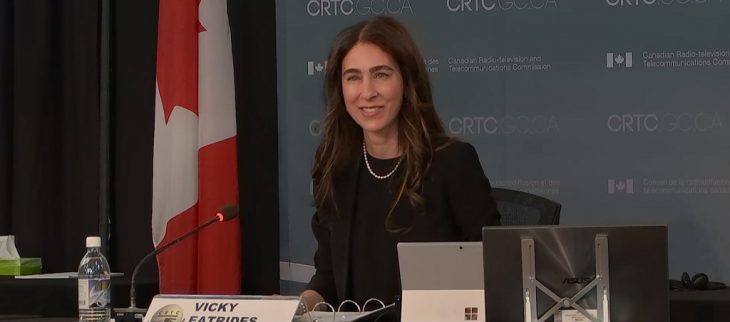
By Christopher Guly
OTTAWA— Bill C-11, which became law on April 27, will serve as “the catalyst” for the CRTC to “start shaping the broadcasting system of the future” through the creation of a regulatory framework, Vicky Eatrides, chair of the CRTC, said at the opening of a two-day conference by the Canadian chapter of the International Institute of Communications (IIC) in Ottawa on Monday.
C-11, or the Online Streaming Act, which amended the Broadcasting Act, “will ensure that all players, including online streaming services, contribute to the achievement of the cultural and policy objectives set out in the Act,” she said.
Last Monday, the CRTC published its plan to modernize the regulatory framework “so that online streaming services make meaningful contributions to Canadian and Indigenous content, and Canadians have greater opportunities to create and access a variety and diversity of content,” said Eatrides.
By week’s end, the commission had launched its first three public consultations, “with more to come,” she added.
Part of the CRTC’s modernizing effort through regulations resulting from C-11 will be review of the definition of what constitutes a Canadian program.
Under section 10, the commission will be asked to consider:
(a) “whether Canadians, including independent producers, have a right or interest in relation to a program, including copyright, that allows them to control and benefit in a significant and equitable manner from the exploitation of the program;”
(b) “whether key creative positions in the production of a program are primarily held by Canadians;”
(c) ”whether a program furthers Canadian artistic and cultural expression;” and
(d) “the extent to which persons carrying on online undertakings or programming undertakings collaborate with independent Canadian producers, with persons carrying on Canadian broadcasting undertakings producing their own programs, with producers associated with Canadian broadcasting undertakings or with any other person involved in the Canadian program production industry, including Canadian owners of copyright in musical works or in sound recordings.”
However, the regulatory exercise should seek to encourage Canadian collaborations with the Netflixes of the world, argued Wendy Noss, president of the Motion Picture Association’s Toronto-based Canadian arm, on a panel at the IIC conference following Eatrides’s keynote address.
The CRTC should look at how streaming services can provide “the most benefit and construct a new framework that addresses that,” she said, adding that the commission should focus more on flexibility than rigidity with its regulations.
Doug Barrett, an adjunct professor in the arts, media and entertainment MBA program at the Schulich School of Business at York University in Toronto, suggested that streamers could be subject to the model that the CRTC has used regarding programs of national interest (PNI).
Currently, the major Canadian English broadcast groups are required to spend between 5 per cent and 9 per cent of their gross revenues on PNI, such as long-form documentary, drama and comedy, and certain award shows – 75 per cent of which have to be made by independent Canadian producers and fall under the 10-point content scale used by both the Canadian Audio-Visual Certification Office (CAVCO) and the CRTC.
“What happens if the commission says to streamers exactly the same thing?” offered Barrett, who participated on the panel moderated by Greg O’Brien, founding publisher and editor emeritus of Cartt.ca.
It’s a matter of “using the commission’s current thinking and applying it to a different circumstance,” said Barrett, principal of barcode SDG, a Toronto-based firm that provides strategic and governance advice to the Canadian media, production and broadcast sectors.
Fellow panelist Tandy Yull, vice-president of policy and regulatory affairs at the Ottawa-based Canadian Association of Broadcasters, said the private broadcasters the CAB represents want the CRTC’s rules “applied fairly” to streaming services.
Joan Jenkinson, co-founder and executive director of the Black Screen Office, situated in the CBC Toronto Broadcast Centre, told conference delegates that C-11 provides unrepresented communities with the right to own the intellectual property of their stories “because they never had the opportunity to exploit their content.”
“Who’s going to tell the story of Blacks in Nova Scotia, or Haitians in Quebec, or Africans in Lethbridge, Alberta – the fasted growing Black population in the country? Those stories are Canadian stories and we want to see ourselves reflected in them,” she said.
“We’re not going to see that necessarily from outside streaming services – and one of the reasons why it’s such a challenge is because we live beside a giant. If we become service producer, our content is going to be Hollywood content – even if it’s shot here and even if we are using junior people as crew and spending money here.”



